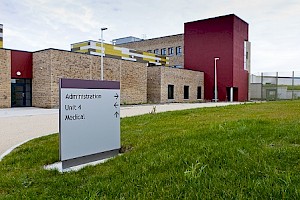Youth Justice
Ireland has a long history of poor responses to offending behaviour by children. A core strand to IPRT's work since its establishment in 1994 has been the promotion of a more effective youth justice system, with emphasis on non-custodial alternatives, diversion, early intervention and prevention strategies and programmes. Central to our work was ending the practice of detaining children in adult prisons, which was in breach of international human rights standards and a serious stain on Ireland's human rights record.
International human rights standards, and in particular the provisions of the UN Convention on the Rights of the Child, are clear that custody for children should only be used as a last resort and for the minimum required period of time. All efforts should be made to apply alternatives to detention to ensure that such a measure is only used in exceptional circumstances.
In Ireland, the Children Act 2001 recognizes the principle of detention as a last resort. The Act prohibits the imprisonment of children and the Criminal Justice Act 2006 makes provision for all children less than 18 years of age to be detained in Children Detention Schools. The detention school model is focused on a model of care, education, health and programmes that address offending, with improved outcomes for the young people, their communities and all of society. The Irish Youth Justice Service is responsible for the Children Detention Schools, within the Department of Children and Youth Affairs.
Following years of sustained advocacy by IPRT, along with many national and international bodies, in 2012 the detention of boys aged under 17 at St Patrick's Institution ended. In March 2017, a Ministerial Order ended the sentencing of children aged under 18 to adult prison in Ireland, and in April 2017, St. Patrick’s Institution was finally closed. Since September 2017 boys aged under 18 are no longer detained in the adult prison system.
IPRT continues to work towards progressive change in youth justice policies and practice, as well as engaging with wider policy and practice issues relating to youth justice, such as the provision of alternatives to detention, diversion and early intervention programmes.

UK: Sentencing Council publishes new guidelines on sentencing children and young people and offenders who plead guilty
7th March 2017
The Sentencing Council (England & Wales) has published two new sentencing guidelines, to come into effect from 1st June 2017. One deals with how courts should make a reduction in sentence for offenders who plead guilty, and the other deals with the approach they should take when sentencing children and young people.
2015 Report on the Garda Diversion Programme
25th January 2017
The Department of Justice and Equality has published the 'The Annual Report of the Committee Appointed to Monitor the Effectiveness of the Diversion Programme 2015'.
UK: Review of the Youth Justice System in England and Wales
22nd December 2016
The Ministry of Justice has just published a comprehensive review of the Youth Justice System in England and Wales. Published in December 2016, the report outlines key issues and challenges within the system and a change in approach towards youth justice in the UK, moving away from punitive responses and towards diversion and treatment. The central themes in the recommendations are for a devolved youth justice system and a focus on education.
Progress Report on Youth Justice Action Plan published
21st December 2016
On 14th December 2016, Minister for Children and Youth Affairs, Katherine Zappone TD and the Minister of State at the Department of Justice and Equality, David Stanton TD published Tackling Youth Crime, Youth Justice Action Plan 2014-2018 - Progress Report 2014/2015.

Detention of Children: International Standards and Best Practice
20th December 2016
A research report from IPRT on the application and implementation of international human rights standards to children detention in Ireland, and how the aims enshrined in these standards can be best achieved in the Irish context.
Beyond Youth Custody: Trauma and Young Offenders
30th November 2016
The recent ‘Trauma and Young Offenders’ report from Beyond Youth Custody (BYC) presents key findings from a review of the research and literature concerning trauma in the backgrounds of young people who offend.
Round Up: Oberstown Review
19th September 2016
A round-up of IPRT statements and comments in the media on the announcement of a review of Oberstown Children Detention Campus by Minister for Children and Youth Affairs Katherine Zappone.
Oberstown Management and Trade Unions must resolve issues urgently to ensure duty of care to children is not undermined
30th August 2016
The Irish Penal Reform Trust (IPRT) has today called on the Minister for Children and Youth Affairs, Oberstown Management and trade unions to resolve the industrial relations issues immediately in order to ensure that their collective duty to the children in their care is fulfilled.
Beyond Youth Custody Practitioner Guide
23rd August 2016
Beyond Youth Custody has published a guide to help practitioners support the transition of young people from custody back into the community.
IPRT welcomes additional funding for youth justice initiatives
6th May 2016
IPRT warmly welcomes the statement issued yesterday (5th May 2016) by Minister for Justice and Equality Frances Fitzgerald TD that an additional €1.57m is to be provided for youth justice initiatives from the Dormant Accounts Fund under the 2016 Action Plan.




